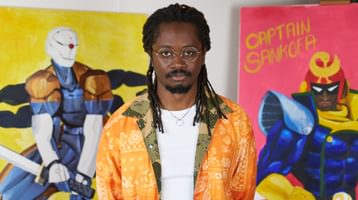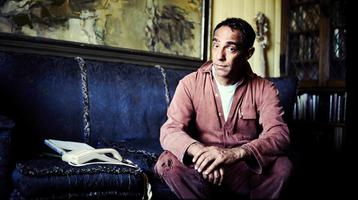Hitting Hard, Soft Absorption: The Philosophy of Balance in Larry Achiampong’s GH0ST_DATA_ Series
The Film London Jarman Award 2024Kaitlene Koranteng & Jessica Wan

Larry Achiampong, A Letter (Side B) (2023), film still. Courtesy of the Artist, LUX, DACS, Copperfield, London. Co commissioned by The Mosaic Rooms, Stanley Picker Gallery, Kingston University and Heart of Glass
'This series of films has been the most difficult and challenging to make, because I’m literally confronting myself in the mirror. I can still see the persistent threads of depression I've experienced—and continue to experience. It's not something that has disappeared; it's still very much present. Suicidal ideation is real. It’s not like I woke up in the Royal London Hospital 13 years ago and had an epiphany that suddenly ‘saved’ me. It’s something I deal with daily, a constant struggle. I think of my friend who passed away during the pandemic, and it’s an ever-present reminder.'
— Larry Achiampong
A Black man is sitting in a room, a pixelated figure in shades of blue, green, and black – all the colours of a bruise – and like a bruise, the man is in pain. A smartly dressed white counsellor conducts an assessment, and in distress, the man asks, ‘Are you here to help me?’ The counsellor, unconcerned, responds, ‘If you cooperate, I am here to help you’. A mantra repeats in the background: ‘Maybe I should be sent away’. The threat of being sectioned looms, an action outlined by the Mental Health Act (1983)1 which allows for the detention and treatment of a patient without their consent, stripping them of their social and medical rights. This scene has played out countless times – human beings, mentally and physically trapped, treated as disposable. Often, those misunderstood are cast away, people who have lived in survival mode, unable to escape fear.
How do we find hope in such darkness? In A Letter (Side B) (2023), Achiampong recounts a deeply personal moment following a suicide attempt in a counselling room, offering a raw portrayal of his mental health struggles. The story unfolds against a backdrop of structural inequalities that historically marginalised communities continue to face today. One such example is the inequitable treatment of Black men in mental health institutions. In 1991, an inquiry into the death of Orville Blackwood2, a Jamaican-born British man at Broadmoor Hospital, Berkshire, revealed that Black people were more likely to be admitted to psychiatric hospitals with police involvement, receive higher doses of medication, and be subjected to blatant institutional racism.
Following images of landscapes and a game of ludo overlaid like memories, at the heart of this work is Achiampong’s strained relationship with his brother, born in Ghana and separated from him by restrictive immigration policies. This personal reflection on the familial bonds broken by external forces, such as systemic injustice, conveys a longing for a connection that circumstances have denied. A collage of archival and contemporary symbols plays out on the screen, and despite the sorrow, a message of hope emerges – ‘I want to be held; to trust that the hands embracing me will not let me fall.’ Isn't that what we all seek in the end? To be held in our most vulnerable moments, lifted despite the structural barriers that suffocate us?
The film also connects the treatment of Black people in mental health institutions with the deep-seeded roots of colonialism. In that same tangle are poverty and class struggle, especially among migrant communities seeking refuge in the very place that often contributes to their displacement. In another betrayal, the colonial superpowers that exploited these nations have created hostile immigration laws, perpetuating cycles of harm.

Larry Achiampong, A Pledge (2024), film still. Courtesy of the artist, LUX, DACS & Copperfield, London.
A Letter (Side B), alongside A Pledge (2024), are part of Achiampong’s ongoing GH0ST_DATA_ series, a semi-autobiographical exploration of depression and Black masculinity. In both works, a hacked Game Boy camera is used to film the opening sequence, evoking a nostalgic yet distorted representation of memory and emotion, and the fragmented nature of familial relationships. The theme of memory is ingrained in Achiampong’s practice and the title of this project, inspired by the concept of ‘ghost data’ in video games – particularly in time trials, where a player races against a ghostly vision of their previous performance. Through these works the importance of learning from the past to do better is offered; A Letter (Side B) and A Pledge asks how we might use the past to prepare for the future and break repetitive cycles of trauma.
In A Pledge, Achiampong is shown as a driver, tight-fisted and alone in his car, gazing out at the street as he recalls his father and their complicated relationship. Through this lens, the film highlights the toll of immigration and displacement on his family, particularly the struggles his father faced during a military coup in Ghana. The latter half of A Pledge features a physical and philosophical engagement between Achiampong and his son through Gōjū-ryū karate, using the practice of randori3 as a metaphor for the hard and soft elements of life and relationships. In his exploration of the familial bonds between father, son and brother, Achiampong presents a vulnerability that Black men are often taught to shy away from in society. Achiampong’s engagement with Black masculinity shows how a willingness to be vulnerable is strength by another name.
These two films offer a deeply personal, honest and nuanced reflection of mental health, a subject rarely met with openness in public forums. In the shedding of stigma, Achiampong speaks out to the world to hold on to your loved ones, and even when everything feels hopeless, when you lose sight of who you are; go back, and find yourself.
1 UK Department of Health, Mental Health Act 1983: Code of Practice, revised and updated (TSO: Norwich, 2015).
2 Herschel Albert Prins, Report of the Committee of Enquiry into the death in Broadmoor Hospital of Orville Blackwood and a review of the deaths of two other Afro-Caribbean patients: “Big, black and dangerous?” (Special Hospitals Service Authority, 1993).
3 Randori [乱取り] is a term used in Japanese martial arts to describe free-style practice, and can be translated as ‘taking control of chaos’.
Katilene Koranteng is an archivist, engagement producer and poet, with an interest in exploring marginalised histories and access to archives.
Jessica Wan is a curator and writer working to platform diasporic and transnational narratives. She has produced projects with institutions including iniva, Transnational Art, Identity and Nation (TrAIN), Photofusion, Tate and Sarabande Foundation.



